
Artificial Intelligence is transforming education. From helping with research to improving writing and simplifying complex topics, AI tools like ChatGPT, Gemini, and Claude offer powerful support for students.
But with great power comes great responsibility.
Here’s how to use AI ethically as a student in 2025 — ensuring you stay honest, learn effectively, and grow your skills responsibly.
1. Use AI as a Study Aid, Not a Shortcut
AI should enhance your learning, not replace it.
Ethical Uses:
- Ask AI to explain difficult concepts in simple terms“Explain photosynthesis like I’m teaching it to a 5-year-old.”
- Get step-by-step help with math or science problems“Can you walk me through solving this equation?”
- Create study guides or flashcards from class notes or textbooks
By using AI this way, you’re improving understanding — not just copying answers.

2. Improve Your Writing — Don’t Let AI Write for You
AI can help polish your work, but it shouldn’t do the thinking for you.
Ethical Uses:
- Use AI to proofread and improve clarity , not generate full essays
- Ask for feedback on structure, tone, or grammar
- Learn from AI suggestions to improve your own writing skills over time
Always review and rewrite AI-generated content in your own words to ensure authenticity.
3. Cite AI When Required
Some schools now require students to disclose when they’ve used AI in their work.
Best Practices:
- Always follow your school’s policy on AI use
- If allowed, mention AI assistance at the end of your paper , e.g.:“I used ChatGPT to help explain key concepts and improve clarity.”
- Avoid passing off AI-generated content as your own original work unless explicitly permitted
4. Practice Critical Thinking with AI Help
Don’t just accept what AI says — question it, challenge it, and compare it with real sources.
Ways to Stay Critical:
- Ask AI to summarize a topic , then verify facts using reliable sources
- Compare AI responses with class materials or textbooks
- Use AI to generate debate topics or discussion questions , then form your own opinions
This helps you stay engaged and develop strong analytical skills.

5. Avoid Cheating with AI
Using AI to write full assignments, take tests, or impersonate your voice or handwriting is considered unethical and often violates school policies.
What to Avoid:
- Having AI write full essays without teacher permission
- Using AI to complete online exams or quizzes
- Submitting AI-generated work as your own without disclosure
Instead, use AI to support your learning journey , not shortcut through it.
6. Use AI to Develop Your Own Skills
AI is a tool — and like any tool, it’s most valuable when it helps you grow.
Smart Ways to Build Skills:
- Practice language learning with AI tutors (like Duolingo Max or Speak)
- Use AI to simulate interviews or public speaking
- Generate practice problems in math, coding, or science
- Learn how to write better by reviewing AI suggestions and applying them manually
Let AI guide you — not do the work for you.
7. Respect Privacy and Data Security
Never share sensitive information with AI tools.
Guidelines:
- Avoid submitting personal ID, passwords, or private documents
- Be cautious about uploading schoolwork to unknown platforms
- Use school-approved AI tools whenever possible
Your data privacy matters — always read the terms and conditions before using any AI service.
FAQs: Frequently Asked Questions About Using AI Ethically as a Student
Q1: Can I use AI to help with homework?
Yes — as long as you’re using it to understand concepts, not copy answers. Always ask your teacher if unsure.
Q2: Is it cheating to use AI for essays?
It depends on your school’s rules. Some allow limited AI use for editing or brainstorming, but never let AI write the whole essay for you.
Q3: Should I tell my teacher if I used AI?
Yes. If your teacher allows AI use, be transparent and mention how you used it to support your learning.






0 Comments